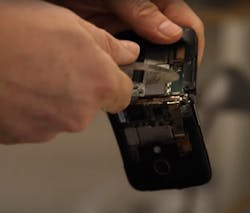Set in the mountains of the upper east side of Tennessee, Carter County hosts a population of roughly 60,000 people. As compared to the rest of the state—and probably most of the country—one could call its size “average.” That’s for the general populace as well as the Carter County Sheriff’s Office inmate population; they run an average of about 340 inmates. The sheriff’s office employs about 60 deputy jailers for the Detention Center and about 60 deputy sheriffs.
Chief Deputy James Parrish connected with Securus Technologies about 2015-2016 and recognized the value of the team, tools, and solutions. Parrish first interacted with the Securus team during his military career. He came from military law enforcement, commanding the Department of Defense Criminal Investigation Task Force—a team of individuals responsible for the investigation of all the detainees from the battlefield.
Tablets and Reducing Recidivism
Securus Technologies also put their sights onto the incarcerated individual. They provide an opportunity for inmates to receive a tablet for education, communications (to more easily connect with loved ones and save money for both the correctional facility and families alike), learning job skills, and more. You can read about a few profiles through the “Improving Lives From the Inside Out” series.
More information can be found at tabletsimprovinglives.com.
Speaking of Securus, “When I met these folks, I immediately realized the value…some of the tools and capabilities that they offered were more powerful and more valuable than anything we were using in the war at that time. I was very impressed with what they offered as far as the effectiveness of their capabilities and the strength of the team that Steve Schneider has put together.” Steve Schneider is the Managing Director of Securus’ Guarded Exchange.
Among others, one of the solutions the Carter County Detention Center utilizes is Guarded Exchange program from Securus Technologies. This involves the live monitoring surveillance of inmate phone calls and a digital forensics service. “Just because an individual is arrested and in jail, doesn’t mean that they cease their criminal activity. It doesn’t mean that we cease to have the opportunity to discover the other crimes that they’ve committed,” says Parrish. Over time, he has discovered that district attorneys have been able to use the capability to strengthen their cases. He calls it “prosecution support.”
For Carter County, Securus has been a force multiplier. “The way we use their tools and capabilities to hit three areas across the continuum: the jail security, the criminal investigation, and the prosecution support. We just don’t have the staff…to listen to all these calls all day. Even if we did we certainly don’t have the tools and the algorithms that Guarded Exchange uses,” says Parrish.
The other half of Guarded Exchange includes digital forensics. And Carter County has seen success. In one ongoing case (at the time of the interview), a captured device led to, as Carter County Sheriff’s Office Criminal Investigator Amos Halava explains it, a “much larger conspiracy case.” While the facility has some on-site digital forensics capabilities, the phone was smashed and flushed down a toilet. They sent it to the Guarded Exchange team to do a “chip off”—a time consuming process that can cost upwards of $10,000 for training. Two days later, they had a full report of what was on the phone leading to a break in the case.
Halava walked me through another example case. A man, in jail for attempting to kill his wife, was ordered to have no contact with her. A deal was to be made for three years come Monday. However, on Friday prior, it came out that a phone call was apparently made. Halava emailed Guarded Exchange quickly. They discovered 300 to 400 minutes worth of calls to sort though and found the call in question. The deal changed to six to eight years.
He says that there have been rare occurrences where the device’s hardware and/or internal memory cards have been ruptured beyond repair making it impossible to extract data. However, he encourages staff to confiscate the device in the exact state they find it. “There’s no need to turn it off or do anything else to the phone. They can then send the device to us in a signal-proof faraday bag, which is a lined metal bag that blocks any signal interference during transit (such as attempts to wipe the phone remotely).”
For a facility that doesn’t have a specialized team in-house, the combination of the live monitoring and digital forensics can truly be a force multiplying effort. As Parrish puts it, “[Inmates] believe we don’t have the staff to listen to every single phone call that comes out of that jail. The inmate is correct…but what they don’t know is that we work with Guarded Exchange and they are listening to the phone calls for us. What the inmates don’t know—that’s fine.”
About the Author

Jonathan Kozlowski
Jonathan Kozlowski was with Officer.com, Law Enforcement Technology, and Law Enforcement Product News from August 2006 to 2020.
As former Managing Editor for Officer Media Group, he brought a dedicated focus to the production of the print publications and management of the Officer.com online product and company directory. You can connect with Jonathan through LinkedIn.
Jonathan participated as a judge for the 2019 and 2020 FOLIO: Eddie & Ozzie Awards. In 2012, he received an APEX Award of Excellence in the Technology & Science Writing category for his article on unmanned aerial vehicles (UAVs) in police work, aptly titled "No Runway Needed".



